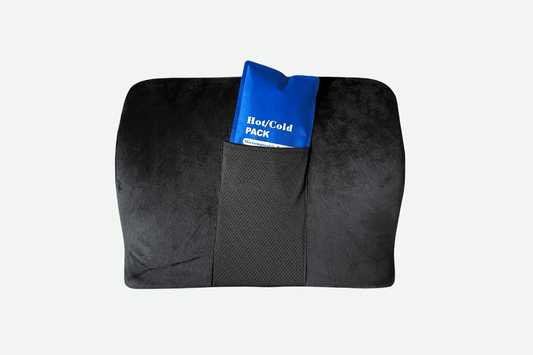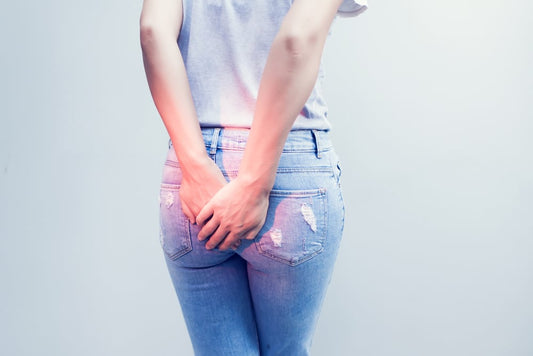Which Hemorrhoid Cream Is Safe During Pregnancy?
Robert Cutler, D.O., FAOCPrShare
Pregnancy is a trial of the will! It's a long and often uncomfortable process, and there are so many side effects. One we hear all about at Doctor Butler's is hemorrhoids (It's our specialty!). As if pregnancy doesn’t cause enough discomfort itself, adding hemorrhoids to the mix just takes it to a whole other level. The good news is, however, that there are remedies proven safe to use as a pregnant woman, so guilt-free relief is on the horizon.
At Doctor Butler's, we use Lidocaine based ointments because they have been deemed safe by the FDA for pregnant women, which you can read more about further down this post. Typically, Lidocaine is administered either topically or is injected, usually for dental work or minor surgery, but is becoming increasingly common in relieving hemorrhoid pain through topical application.
There are multiple studies showing Lidocaine's use in reducing pregnancy pain and documenting any downstream effects on the mother, fetus and breast milk. Unfortunately, no studies specifically focus on topical Lidocaine treatment for hemorrhoid relief in a pregnant mother. But from the studies that exist we can conclude that Lidocaine is safe to apply to hemorrhoids in pregnant woman when used at the correct dosage and according to packaging instructions. It's generally recommended to use Lidocaine products after the first trimester, which we explain more about below.
While clinical decisions remain the responsibility of medical practitioners and specialists in pre- and post-natal care, Doctor Butler's uses the most current standards of medicine in everything we do. Scientific data and medical trials tell us which ingredients have been found safe to use topically while pregnant and nursing, and which medications you may want to avoid.
You don’t have to live with the pain, irritation, itching, and swelling worrying that treating yourself might harm your baby. If you need more information before making the decision to talk to you doctor about what's right for you, stick around and read our guide on hemorrhoid creams so you can learn which ointments are safe for your baby and get yourself some much-needed relief. Here is what we know as experts in anorectal care.
What are Hemorrhoids?

Hemorrhoids, or piles, are inflamed blood vessels that develop in the anus from pressure, often the result of many factors including constipation and the pressure of pregnancy. Hemorrhoids come in two varieties. Internal hemorrhoids form inside of your rectum while external hemorrhoids appear on the outside of the anus.
What Causes Pregnancy Hemorrhoids?
More than 50% of pregnant women get hemorrhoids so there’s greater than a half and half chance you may experience them, too. The third trimester, or the final three months of the pregnancy, is when to expect pregnancy hemorrhoids. That’s the point when your blood flow increases. This alone can cause blood vessels to swell, but your growing uterus adds another layer of risk with the immense pressure it puts on the pelvic wall. The veins in your rectum don’t stand much of a chance with pressure coming at them from two different sources.
Pregnancy also causes an increase in progesterone production. Progesterone is a hormone that can relax the walls of your blood vessels, which means it’s much easier for them to become inflamed and swollen. Of course, pregnancy can sometimes come with constipation as well, which is one of the most common causes of hemorrhoids in everyone, pregnant or not. Your risk of hemorrhoids goes up higher if your constipation makes you strain on the toilet.
Hemorrhoids can cause itching, irritation, and pain. You may find it uncomfortable to sit and often, sufferers can feel a bulging lump or clusters of them around the anus. They can also cause bleeding during bowel movements and are all-around frustrating to have.
It’s not all bad news, though. Once you’ve given birth, any pregnancy-related hemorrhoids you might have are likely to clear up on their own. That doesn’t help now though, does it?
Questions we'll answer in the next section:
Let’s jump into it!
So, Which Hemorrhoid Cream is Safe During Pregnancy?

Which hemorrhoid cream is safe during pregnancy? We at Doctor Butler's use Lidocaine as the main pain relieving topical anesthetic in our hemorrhoid formulas because it is a low-risk category B drug. That means it is considered to have almost no negative effect on the fetus or mother, as there are no proven risks in humans and animal studies have failed to show any risk to the fetus. Medical consensus around topical Lidocaine use during pregnancy is mixed, generally advocating for use after the first trimester of pregnancy, as we explain below.
Most tests of Lidocaine during pregnancy were not on hemorrhoids but on other uses of Lidocaine such as epidurals during labor and dental work during pregnancy. Topical application of Lidocaine for hemorrhoids is rarely discussed in the context of pregnancy. However, because hemorrhoids are a huge problem for pregnant women, more research into solutions is needed in the area. One 2019 study testing both topical and suppository based Lidocaine prescriptions explains that Lidocaine indeed helps reduce subjective hemorrhoid symptoms in women but insists that more studies should be done, and reaffirms the safety of the drug past the first trimester.
How soon you should use Lidocaine for hemorrhoids while your baby develops in the womb is up to you and your doctor. It's recommended to wait as long as possible without using Lidocaine, especially as the baby is going through its first stages of development during the first trimester because Lidocaine can enter the bloodstream upon usage. This delay is mainly out of caution, and if there are cases where the benefits of Lidocaine are great, many doctors may recommend use in special cases. But for hemorrhoids, you'll likely be told to wait.
No special precautions are required if using Lidocaine during breastfeeding, which has been confirmed through extensive medical testing of intravenous infusion and high doses of topical anesthetics specifically for labor pains. Still, you should speak with your doctor before using Lidocaine if you are breastfeeding, as the medicine can pass on to breast milk in small amounts. It is not considered harmful to the infant, but it’s always best to discuss it with your doctor anyway.
Other Products to Treat Hemorrhoids During Pregnancy At Home

Ointments and creams aren’t the only solutions for how to treat hemorrhoids during pregnancy. There are numerous other solutions on the market that can bring relief while you’re pregnant. In fact, if you want to avoid medicated options, there are plenty available. Let’s take a look at some of these products.
Perineal Spray
Doctor Butler’s Pregnancy and Postpartum Spray provides relief and protection for your skin “down there”. Instantly soothe any burning with this non-toxic herbal spray. Shop Doctor Butler’s perineal spray today.
Epsom Salts
Soothe hemorrhoids, reduce inflammation, relieve constipation, and experience relaxation with an Epsom salt soak in warm water. Calm your hemorrhoids with Epsom salts from Doctor Butler’s.

Memory Foam Seat Cushion
Sitting can be uncomfortable when you’re struggling with hemorrhoids while pregnant. This foam seat cushion from Doctor Butler’s provides relief and takes the pressure off. Shop our memory foam seat cushions now.
What To Do to Prevent Hemorrhoids During Pregnancy
50% of pregnant women have to suffer with hemorrhoids but you can better those odds with some preventative measures. Preventing hemorrhoids can be tricky and you might still experience them no matter what you do because pregnancy can cause a great deal of pressure, but these tips and tricks are pretty easy to accomplish and they’ll certainly improve your odds. Let’s take a look at some pointers to lower pressure levels.
First, you want to prevent constipation and that means eating enough fiber in your diet. Veggies and fruits in every meal will help with this, but you may also think about incorporating a fiber supplement into your daily routine. A high fiber diet will keep constipation away, effectively preventing hemorrhoids from this source.
Hydration is also key to staving off constipation, so make sure you’re getting enough H2O throughout the day. While you’re drinking water, reducing your caffeine intake is also a good practice for expectant moms avoiding hemorrhoids.
Finally, get up and move around. Sitting or standing for long periods of time in the same position can put extra pressure on your lower regions and exacerbate or cause hemorrhoids.
Leave the Pain Behind with Hemorrhoid Cream from Doctor Butler’s!

While hemorrhoids are common and expected during your third trimester of pregnancy, there is no need to suffer from the pain and discomfort. There is a multitude of hemorrhoid relief solutions out there that are perfectly safe for a pregnant woman.
For hemorrhoids pregnancy treatment, our lidocaine based ointments provide powerful relief from pain, itching, swelling, and discomfort. Speak to your doctor about the best time to use it. Natural solutions like sitz baths and memory foam cushions can relieve the pressure and offer instant comfort, and treatments like our cooling mineral oil-based pregnancy spray are a quick & easy solution to pregnancy pains down there.
Doctor Butler’s has formulated all of these products to be safe and effective following modern scientific practices and the FDA's guidelines. So, don’t suffer a moment longer. Shop Doctor Butler’s full line of hemorrhoid solutions today!


